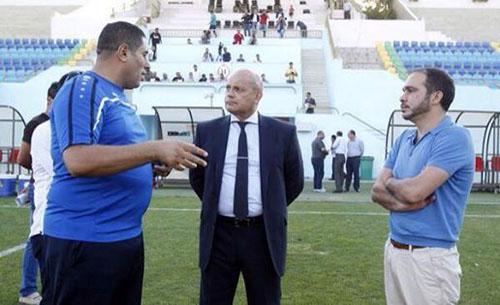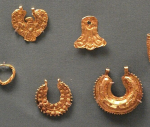You are here
Wilkins eyes top spot at Asian Cup
By Muath Freij - Nov 22,2014 - Last updated at Nov 22,2014

AMMAN – The Jordan national football team strives to be among the top four teams at the Asian Football Confederation’s 2015 Asian Cup in Australia, the team’s head coach Raymond Wilkins said.
The coach’s minimal goal is to reach the quarter-finals, the Englishman told The Jordan Times in an exclusive interview on Thursday.
Jordan plays in Group D and takes on Japan, Iraq and Palestine.
“The group is tough, but not impossible. We have to finish in the top two to progress. So with a bit of luck, and we need luck in football, we can progress forward. Whenever I look at the players they give me the impression they are confident,” he said.
Wilkins’ aim is to go far at the tournament.
“We have to reach a level where we are competitive against whoever we play,” he added.
The head coach is enjoying his job in Jordan very much although the experience of coaching an Arab team and dealing with Arab players is different from what he is used to back in England.
“At the end of the day it is human beings we are dealing with. Obviously, we have different coaches and different way of playing in Europe, but I enjoyed it immensely,” he added.
Wilkins, who took over as national team coach in September, said he is very fortunate that the Jordan Football Association (JFA) is really supportive.
“The players also do everything asked of them. They do not always succeeded, but they do try,” he added.
Commenting on the negative results the team achieved since he took charge of the team, Wilkins said despite the results they had in the friendlies, he is sure once the team wins one game players’ confidence levels will rise.
Under Wilkins Jordan, better known as Nashama, has so far played four matches, losing three and drawing one.
“The Jordanian fans are right to be worried as I am very worried. Once the team wins one game, we will win more games and the confidence will come back to the team. In Estonia, we had four to five chances to score but we did not. This is life and this is football,” he added.
He stressed that the team’s trip to Estonia was very important because it gave him a chance to see how players handle external factors, such as the freezing temperature.
“In Estonia it was very, very cold. And you see a different character came out in different players and that for me was very important and it was really a good exercise,” he added.
He noted that the purpose of playing in Estonia was also to test the physical fitness of his players.
“The physicality of Europeans is totally different and I also wanted our players to have a different kind of experience with a European referee,” he added.
Wilkins said he spoke to some of the players to find out about this new experience.
“I said, what did you think of the referee? The players were astounded because the referee did not give out many fouls. In Europe, you do not give a foul every time a player goes down. I wanted the team to experience that because if we achieve our goal of playing in the World Cup we will have referees not only from Asia, but from anywhere in the world,” he added.
He noted that Asian referees are totally different.
“I watched the games when we played in Jordan, I asked myself what was the referee doing? But I had to remember that I was not in Europe and referees here are different. I think the Estonia match was a good experience for the players because every time they get hit, they say it is a foul and I tell them it is not a foul, you have to compete,” he added.
He said many of the national team footballers who play in other Arab leagues do not play a lot.
“Fitness is one of the things I noticed with the games. When we play for one hour, we are very good but by the end of the match, we have a problem. Players are not fit enough to keep the momentum going,” he added.
He noted that he feels sorry for the players because they come back to Jordan, they train very hard and get better, but when they go back to their clubs they don’t play.
“I asked some players, whom I hadn’t seen for three months, ‘When was the last time you played?’. They replied, ‘It was with you coach’. So their fitness level is down and we have to work on that. It is really important for them to keep playing. Some players are physically strong because they play,” he added.
He noted that the team’s level of technique is fine yet it has to improve, but the most important thing for him is fitness as the players cannot physically play 90 minutes at a high level.
He said for the Kingdom to move forward, officials have to sit down and restructure the league in a better way because it is important to have a good Jordanian league.
“For example, do not allow young players at the age of 19 or 20 to go outside the country. For them to get more experience one can allow them to leave at 21 or 22 years of age. The biggest tip I have for the Jordanian league is to keep players in Jordan,” he added.
Regarding the Jordanian goalkeeper Amer Shafia, who was kept out of the team’s line-up, Wilkins said he is thinking about many players but certainly Shafia is “in my head”.
“The door is still open to him,” he added.
In the meantime, he noted that the other goalkeepers who are working hard should be given a chance.
“We try to give everyone an opportunity,” he added.
Wilkins won 84 caps for England during his playing days, which spanned more than two decades, according to Reuters. He played as a midfielder for a handful of different teams, including Manchester United, Chelsea and Queens Park Rangers.
He began coaching in 1994 and worked as an assistant coach with several teams, including Fulham, Chelsea, Watford and Millwall.
He returned to Fulham as an assistant coach in 2013 before leaving the post earlier this year, according to Reuters.
Related Articles
The National football team plays its first friendly against Kuwait on Friday in the final phase of preparations for the Asian Football Confederation (AFC) 2015 Asian Cup in Australia.
The Jordan Football Association (JFA) on Tuesday appointed Englishman Raymond Wilkins as head coach of the national team and his compatriot Francis Anthony as assistant coach.
The national football team lost 2-1 in a friendly against Uzbekistan in Dubai on Sunday as the team started the final phase of preparations for the Asian Football Confederation (AFC) 2015 Asian Cup in Australia.
















